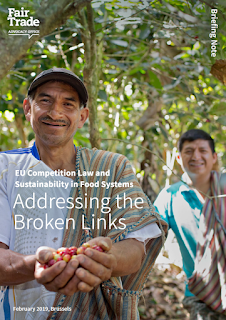The Fair Trade Advocacy Office (FTAO) has launched a report shedding light on the changing nature of competition law and showing where it is currently obstructing sustainability in food systems. The authors give recommendations how to mend the broken links between EU competition law and sustainability to support overreaching policy goals such as the Sustainable Development Goals (SDGs) or climate commitments.
The question of whether and to what extent EU competition law can be a tool for sustainability had already been controversially discussed well before the Bayer-Monsanto merger. But this debate is about to be accelerate amidst Germany’s recent announcement to seeking revision of European competition law in their 2020 presidency following the prohibition of the merger between Siemens and Alstom. FTAO welcomes that the recent European Parliament Resolution of 31 January 2019 on the Annual Report on Competition Policy by the European Commission already made strong references to sustainability.
EU competition law’s current main focus on lower prices, more innovation and a wider availability of products for consumers puts not only burdens on the creation of European industry champions but also, more importantly, on sustainability. The narrow lens of consumer welfare hinders the ability to see the ways in which the production of cheap and available products may affect the environment and
the social foundations of our society.
FTAO commissioned the report “EU Competition Law and Sustainability in Food Systems: Addressing the Broken Links” to investigate the broken links between competition law and sustainability. The authors of the report, Dr Tomaso Ferrando (University of Bristol Law School) and Dr Claudio Lombardi (KIMEP University), make a strong case that EU competition law cannot be viewed in isolation but needs to be applied in conjunction with other EU laws, principles, and objectives.
For EU competition law to support -or at least not obstruct- the achievement of the Sustainable Development Goals (SDGs) and the social and environmental commitments in the EU Treaties, the report suggests interpretative, institutional and regulatory changes to the current EU competition framework. For example, EU competition law should not prevent a sector commitment to paying a living wage to farmers in the global south who are selling agricultural products into the EU market.
The full report and a briefing note can be found here.

No comments:
Post a Comment